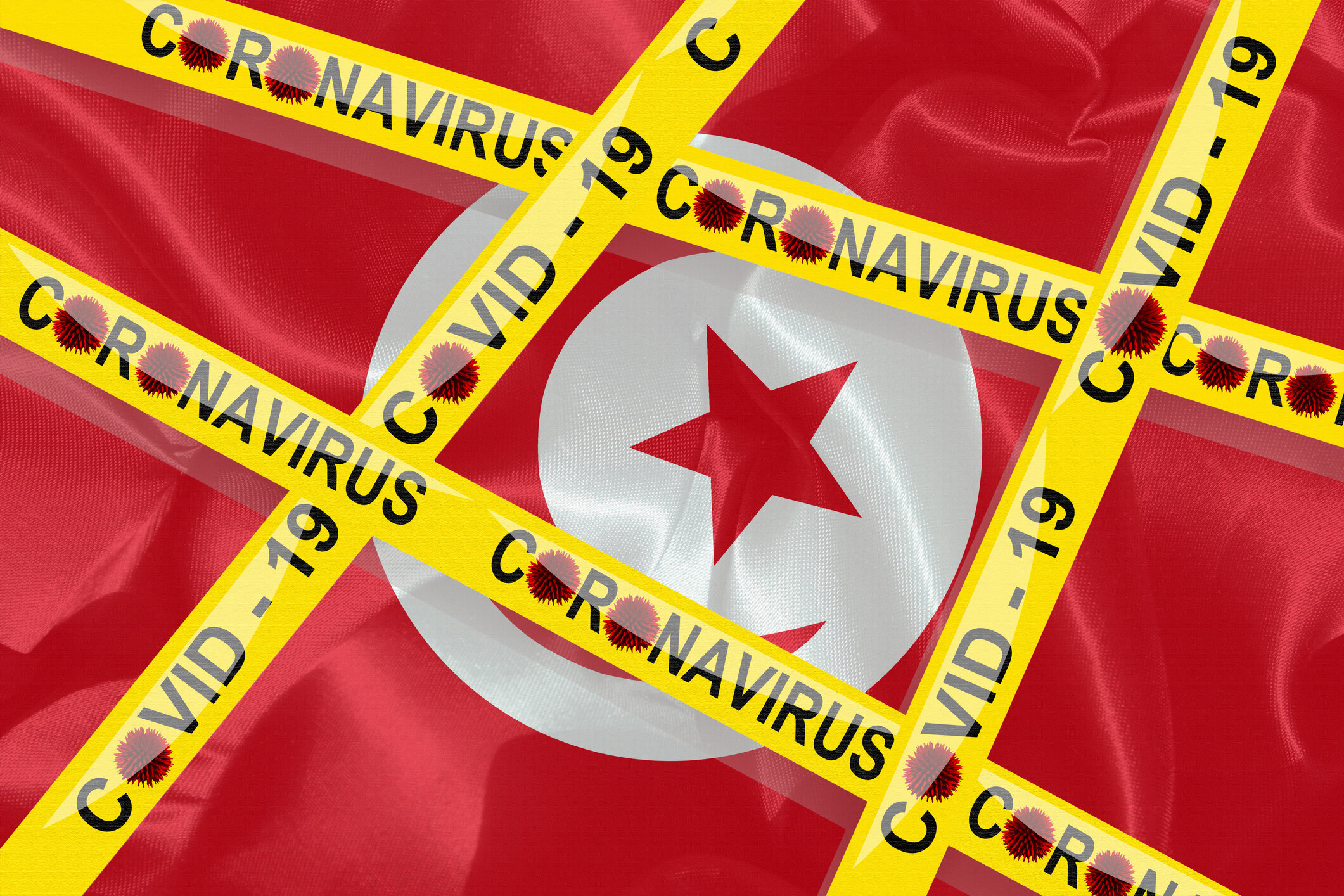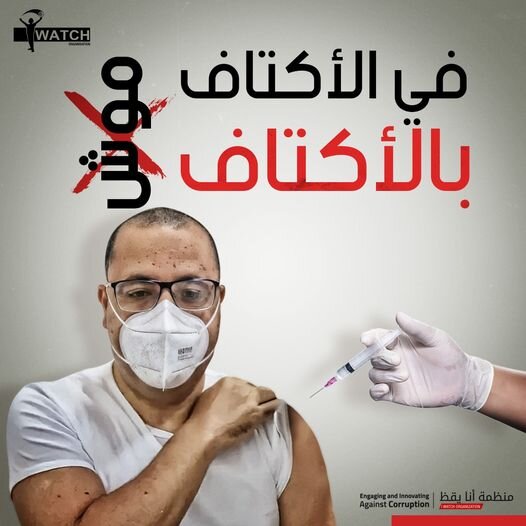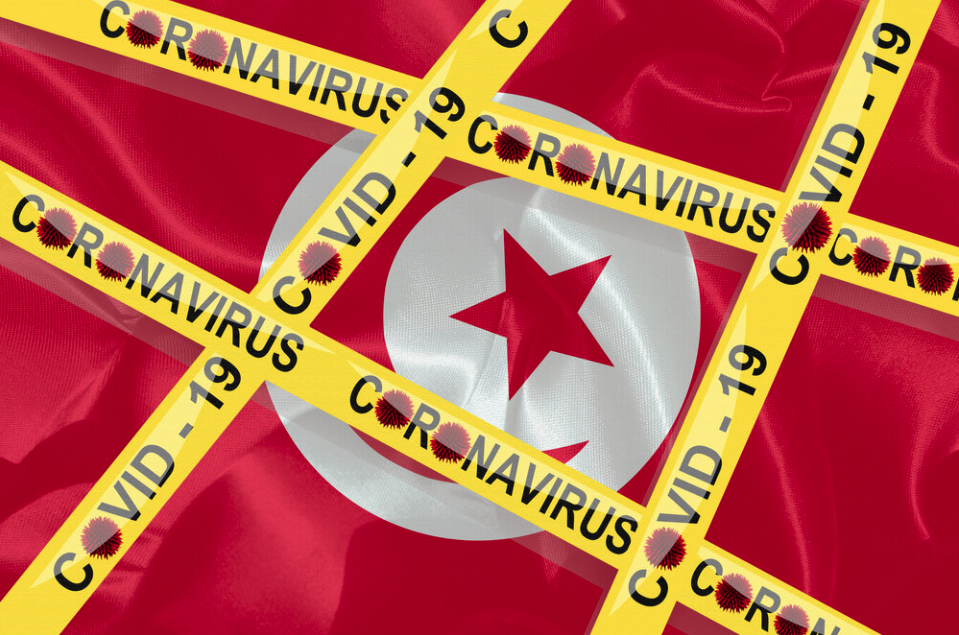
Emna Mizouni
Tunisia was among the first countries in the world to take severe measures to fight the Covid-19 virus. Flights were cancelled gradually until there was a total shutdown, and all sorts of public gatherings such as conferences, cinema and theatre were cancelled — although not football games! Soon after these measures, the government declared a curfew, followed by a general lockdown. In early June 2020, the country started to open up with a targeted lockdown. At the time, Tunisia was registering zero cases. A mandatory quarantine on all arrivals from abroad was established, yet the political system, as fragile as it is, lifted this mandatory confinement to help declining tourism and consequently the economy. It was a victory that didn’t last.
A stronger third wave hit hard some months later, however the abatement measures remain arbitrary and inconsistent. We’ve been in curfew since October with periodically shifting hours and general lockdowns when curfews were insufficient or political authorities feared mass mobilization. Public hospitals are at full capacity and the cases are increasing dramatically.
“Tunisia has the highest Covid death rate of all North African countries, with over 13,000 fatalities, compared to only a little over 3,000 in neighboring Algeria and Libya. ”
With the upsurge in global vaccine news, we had high hopes and in fact, politicians promised to bring vaccines in no later than February 17 this year. Of course, this promise was never kept. The first arrival was the Russian Sputnik vaccine in early March 2021 and delivery of other vaccines has lagged.
Vaccine situation in Tunisia
The Ministry of Health created a new system to go through the vaccination process, prioritizing frontline health workers with the first received doses, then requested all citizens and residents of Tunisia register in a dedicated portal that went online in January.
It all sounded good until vaccinations started and the virus began to spread. It turned out there was an error in the system programming and those who registered early were forgotten. The website remains inaccessible from abroad; Tunisians overseas weren’t able to register their elders. The second registration method is to call a local number that is so consistently busy that you would think your grandma was calling everyone over the phone. The third way for registration, SMS text messaging, gets ignored more than telecom operator notifications. Each of these steps have been attempted by many people who contested their functionality on social media.
Yet, the positive side of the process has been that some people get lucky; having registered, they were invited to get their dose. In that process, there is no priority verification of the data inserted upon registration.
Certification became available in the portal evax.tn starting from May 3.
As of this writing, about 900.000 vaccinations had been delivered (less than half of those received their second shot). In a country of 12 million inhabitants, with a high rate of death per capita, only two million are registered to receive the vaccine and less than a million received at least one shot since March 2021.
Tunisia has the highest Covid death rate of all North African countries, with nearly 14,000 fatalities, compared to only a little over 3,000 in neighboring Algeria and Libya.
Awareness campaign and citizen mobilization
I Watch guards against wasta and other forms of corruption.

As in most countries, the vaccination in Tunisia was set to be available for everyone. However, the work to get the needed doses wasn’t free and available. The majority of vaccine doses were purchased by the taxpayers’ money.
1. One citizens online information point is a Facebook group Where is the vaccine? (winou ettal9ih). In Tunisia, Facebook is the internet, so Tunisians rely on it to get their news. It’s the number one platform in the country. To obtain updates and report on citizens’ experience with the vaccine, a Facebook group was created. Initially the group sought to pressure securing the vaccine and then it turned into a focal point for everyone to get updates on vaccination centers, their opening hours, Eid break and strikes (yes we go on strike and take the Eid holiday in the pandemic), etc. The group interactions helped mobilize many people and gave many courage to vaccinate after the misinformation from countless sources had discouraged them.
2. Civil Society and Activists call :
To push for the vaccination requirement and transparency, I Watch, a national watchdog organization, developed a campaign against the government’s nepotism. Many people contested publicly the different cases of nepotism and disrespect to the priority group set by the Covid-19 Scientific Commission. Some of them urged former parliamentarian and human rights lawyer Bochra Belhadj Hamida to launch a petition. Things started to change accordingly and the chain of vaccination now includes frontline workers in the tourism sector, as the country is prematurely opening in June for tourism with less restrictions or quarantine requirements.
3. Between anti-vaccination and freedom of expression: Angelina Jolie’s lookalike spreads chaos:
While the National Mufti declared that the vaccine was safe during Ramadan, a TV channel in Tunisia started a show discouraging people from the vaccine, which depicted a look-alike of Angelina Jolie in a vaccination center where people die after getting vaccinated. At the same time, the Covid-19 related death rate was increasing (about 100 registered deaths daily). The WHO sent an official letter to the Tunisian Government to shut down the show.
Nepotism and mismanagement
While the country was begging for vaccine doses, a parliamentarian leaked that the Tunisian Presidency received 500 doses from UAE in October 2020 without publicly declaring it. Other than being strictly available to the military, no other updates were announced.
The Covid-19 Scientific Commission of the Ministry of Health set up a priority list starting with healthcare workers (doctors, nurses, pharmacists et alia), then used age as the top factor (75, 65-74, 60-64), then patients with chronic illness and at the end of the list the professionals of the service sector that are at high risk. Yet, unlike other countries, there was no clear timeline or phases for these prioritized people. The professionals at less risk such as Director Generals and Ministers were vaccinated before the citizens aged over 70 years old, many of whom are still on the waiting list as of this writing, or who never were able to register. Ironically, even the professionals of the medical sectors who aren’t exercising got vaccinated; an Instagrammer who is a non-practicing pharmacist was vaccinated at the beginning of the campaign.
The inefficiency of the process resides in many steps. For example, for the old people who cannot move, there is no facility to vaccinate them at home. The daily extra non-used doses are thrown away; so if someone misses the appointment, their dose isn’t allocated on the same day for another person but tossed because there is no walk-in or list B contingency. It’s worth noting again that these doses are paid for by the taxpayers.
Tunisia received the first direct purchase of Pfizer vaccines in Africa. Here Ambassador Donald Blome joined Minister of Health Faouzi Mehdi and the Tunisia Country Manager of the American pharmaceutical firm Pfizer, Walid Lakhdar, at Tunis-Carthage Airport to welcome the first installment of a total 2 million Pfizer/BioNTech COVID-19 vaccine doses for Tunisia purchased under a direct bilateral agreement with the company.

More on nepotism: Arwa Ben Abbes, a parliamentarian from Ennahda and a member in the parliamentarian commission on the administrative reform and anti-corruption, was privileged by her friend to get vaccinated in a center in Manouba without being registered there or even being in the priority category. The nepotism and wasta in Tunisia is found at all levels, even on the commission that supposedly fights it!
The USA, a major contributor to the COVAX initiative, has already provided about two million Pfizer doses as well as a huge donation to the Tunisian government to respond to the crisis. Yet, the political inefficiency and mismanagement of the vaccination and procedures has crippled Tunisia. It becomes more and more difficult to get over the Covid-19 crisis and its repercussions. In some areas, public hospitals, the only place to treat Covid-19, are full with no capacity to accept even urgent cases.
What Tunisians Demand is Equality for All
Restrictive measures to manage Covid-19 should be equal for everyone. However, implementation varies depending on the party or the category of people involved. For example, no (cultural) events or political protests are allowed unless the Chief of Government is invited or it is a political protest that supports his government. In May, for example, Prime Minister Hichem Mechichi paid a visit to the annual Jewish pilgrimage in Djerba and before that he attended a Ramadan Tarawih prayer in Kairouan. He also appeared at many funeral services of leaders of Ennahdha Party such as the late Meherzia Laabidi. This was also recorded when the government allowed a massive protest organized by Ennahda and prior to that the same current government attacked or denied almost all other social protests.
Beginning of today’s march in support of national unity and the democratic process #Tunisia pic.twitter.com/B1UCxY3ETk
— Ennahdha Party (@EnnahdhaParty) February 27, 2021
Even for those vaccinated in the USA, it still feels unreal to go out without a mask, while in Tunisia, unvaccinated people and sometimes Covid-19 positive ones live normally and move without masks or social distancing. At the current rhythm, Tunisia will need three years to get 70% of the population vaccinated. This is an unrealistic and dangerous situation to maintain in a country that relies on services and tourism to live.
After suffering from a chaotic health system and continuous protests of the economic situation, some citizens are more reckless than before based on a general sentiment that the government has let them down in fighting the virus. Many have lost so much that they feel they have nothing else to lose, so they go on with their lives. Borders are wide open for tourism and the mandatory quarantine became an exception. Cases of the South African variant have already been registered.
On a more upbeat note, at the end of May a new follow-up protocol for vaccinated people was announced by the country’s Director of Medical Research, according to Agence Tunis Afrique Press. This will include an electronic vaccination card in the official portal. Even slowly the chain seems to get moving. Compared to other countries, there is no option in Tunisia to choose which vaccine to take (J&J, Pfizer, AstraZeneca etc), nor even a hygiene standard to make sure the person wears gloves before they vaccinate you. Those who are lucky get vaccinated with whatever is available on the day.
It will require more work to get enough vaccines for the country’s residents and definitely more efficient management to get out of the current crisis. Unfortunately, the experience in Tunisia remains not unlike many other countries in the region and the world where the pandemic will continue to exacerbate inequities.












